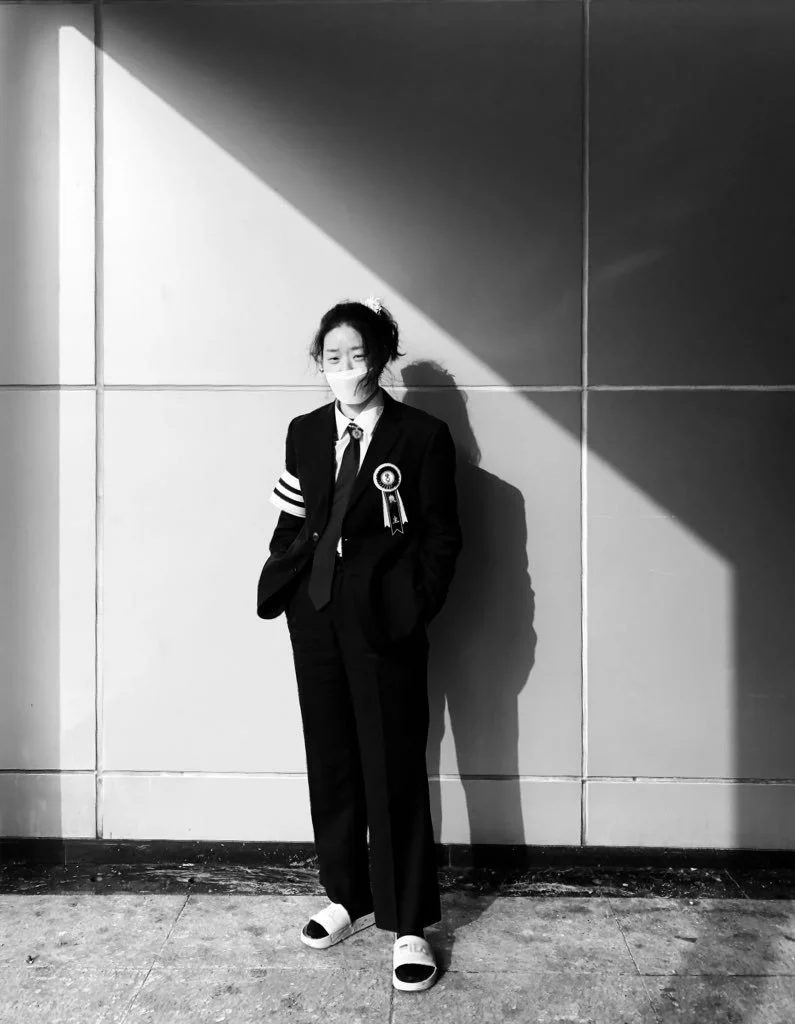Lang Lee on loss, growth, and surviving as an artist
By Sam Choi (@semi_holic) and Jamie Finn (@jamiefinn2209).
This article is taken from Issue #3 of Platform Magazine. You can order the print edition of our magazine by clicking here.
As we enter Lang Lee's cosy house, we are greeted by the singer and her cat Junichi. "He's sick at the moment," she informs us. "We're not sure what's wrong, but it's something to do with his stomach. If he's not very friendly, that's why." In fact, the opposite is true, and both Junichi and Lee receive us warmly. Lang Lee pours us some hot tea, and we begin our interview.
A few days before meeting her, Lang Lee was on stage at the 2022 KMAs, receiving Best Album and Best Folk Album awards. Now in its 19th year, the Korean Music Awards is a prestigious event honouring the best acts across the country. This year, Lang Lee received more nominations than any other artist.
This, however, is not the first time Lee has appeared at the KMAs. In 2017, she sparked controversy when, during her acceptance speech for Best Folk Song, Lee auctioned off her trophy to the highest bidder. "It was all planned in advance," she tells us, "and selling the award was fun."
The response to the incident did not match Lang Lee's enjoyment, though. "I received a lot of criticism for that," she tells us, "some of it was quite aggressive. I was accused of having bad manners, and some people said, 'she is only interested in making money'." Lang Lee has questioned if the negative response she received might have been because she is a woman. "Some have suggested that had a man done the same thing, everyone would have just laughed it off. I think that's probably right, but I can't predict how a performance will be viewed, so I can't worry too much about that. I see myself as just a person; I want to be true to myself and talk about what I'm going through."
2022 has been a year in which Lang Lee has received several awards. As well as the KMAs, she also received Discovery of the Year at the Seoul Music Awards earlier this year. The SMAs are generally more associated with k-pop, so Lang Lee getting chosen is a big deal. Lee also did a powerful performance of her 2021 song There is a Wolf at the event. Dressed in a black, almost militaristic pantsuit, Lee sang the song surrounded by white-gowned choir singers performing while doing sign language. "I had to finance that performance myself," she tells us. "The SMAs didn't offer me any prize money or even any support for putting together my performance. Because of this, I wasn't sure if I should even go to the awards. In the end, I decided that this was a good opportunity to reach an entirely new audience and work in a new environment. So even though there wasn't any fee, I started to prepare for the performance. I began to think of their stage as my fee, their equipment, their cameras as my fee. Reaching their audience was my payment."
“ I can’t predict how a performance will be received. I try not to worry about that. I have to be true to myself and talk about what I’m going through.”
Despite only having 15 days to prepare, Lee created a stunning performance - visually striking and dripping with narrative. In ways, this rendition felt like a short movie. "I wanted the band's costumes to channel the aesthetic of revolutionaries. The choir's attire symbolised those who have died fighting for revolutionary ideas."
Fighting for what you believe in is clearly essential to Lang Lee, and she wanted to use this performance to demonstrate her views on discrimination. "The choir on stage with me are all amateurs. They sing about feminism, LGBTQ rights, and the rights of unmarried people. Even though they're not considered a professional choir, I wanted to work with them. Their identity and values resonated with me, and I felt connected with them."
She even delivered an "Anti Discrimination Act, Now" message spoken in sign language by the choir singers. Despite all the campaigning, the Korean government is still yet to introduce a single anti-discrimination law. "I thought that this broadcast was a good opportunity to promote that message." Lee was concerned about how a negative response to the performance would affect her collaborators. "I was worried that we'd get criticised, like after I sold my award. I checked with my band and the choir singers that they were comfortable with that risk, and they all said yes. In the end, though, nothing happened. The response has been very positive."
Much has changed for Lang Lee over the last decade, especially regarding her approach to making music. "I made the first album, Yonyonsewun, just for fun while I was at university. It was mostly just to play for my friends. I didn't have any plans to pursue a career as a professional musician. Yonyonsewun was made on Garage Band. The vocals were recorded just using my MacBook's internal microphone."
After the release of her debut, she started performing live more and more. She also began connecting with other artists. During this time, Lee began to change her attitude towards music, and the themes of her lyrics became heavier. "My early songs were all about me, my family, my lovers, what I wanted to eat. At university, I didn't think about the world around me that much. After university, I was thrown into society. I had to find a home, I had to pay off my debts, I had to pay bills. They never teach you about that stuff in university. It was around this time that I started thinking about how the world is and how society is. That's why you'll find much more serious lyrics on my second album, God's Play. I sang about things like depression, sadness, anger, and shame that I felt when I was thrown into society." The title track is a perfect symbol of her growing lyrical maturity during this time. 'How does it feel to be born and grow up in Korea? Do you sometimes feel like you've been thrown into a desert?'
After that, Lang Lee became interested in viewing the world through the eyes of others. "When I made my third album, There is a Wolf, I was thinking about how everyone else lives and how they got to where they are in their lives; I started imagining the lives and experiences of other people in greater detail. Half the songs on that album are written from the perspective of others." Just as with her previous album, the title track is a great example of this. There is a Wolf acts as a critique of society through the eyes of a witch, a heretic, a mob, and of course, a wolf. "I held a vote for which of the four characters I should use for the song's title, and the witch overwhelmingly won. I chose the wolf anyway. "Wolf" felt more suitable for the song. Using "Witch" or "Heretic" sounded too intense. "Wolf" sounded more profound and would be longer lasting in the mind of the audience."
““I sang about things like depression, sadness, anger, and shame that I felt after I had been thrown into society.””
Last year, Lang Lee collaborated with Japanese artist Yuta Orisaka for the track Glitter Path. "I haven't seen him for about two years," Lang Lee tells us, "but we're very good friends. When I worked on this song with him, we couldn't see each other, which was sad. So I wrote some lyrics about two people on either side of a river who couldn't meet." This was not the first time the two had collaborated and, in a strange twist, not the first time the two produced work involving a river. "We hung out at the Han River a lot," Lang Lee tells us, fondly remembering her friendship with Orisaka. "I showed him videos of political protests in Korea that were calling for the resignation of President Park Geun hye. During the protest, there were musical performances, and that's where he heard the song Tuning (조율) by Han Young ae. That song really spoke to him, so we decided to cover it. This was during the recent "No Japan" movement in Korea: anti-Japanese sentiment was really high here. We thought it would be meaningful if we could collaborate on that song. We recorded the video in front of the Han River".
While talking about her relationship with Yuta Orisaka, Lang Lee's breathing begins to change. Her eyes lower to the table, and she puts her hands to the side of her head. Something isn't right. She is having a panic attack, an affliction that has begun to impact her with increasing regularity. "A lot is happening in my life right now," she shares, once the attack has subsided, "I'm not sure what triggered it this time. It's sometimes difficult to talk about this stuff in Korea, but I want to express what I think and feel".
Lee has indeed been facing an incredible amount of personal challenges recently. Most notable of which is the loss of her sister, who tragically took her own life in December of last year. "She was suffering for a long time," Lee tells us. "She had depression, insomnia and panic attacks. At her funeral, they tried to stop me wearing a memorial armband." In Korea, it is customary for a male family member to wear an armband that signifies that they are the chief mourner. However, Lang lee remained typically defiant of patriarchy. "Someone from the funeral service told me that I couldn't wear one because I am a woman. I told them that I'm not female, and I got the armband. I should not be prevented from representing the loss of my sister just because of my gender."
“I should not be prevented from representing the loss of my sister just because of my gender.”
This is not the only time that Lang Lee has had to deal with loss in recent years. In the summer of 2020, a close friend of hers passed away after a long battle with cancer. While the loss of her friend was incredibly sad, it did lead Lee down an interesting and surprising career path. "After my friend was diagnosed," she tells us, "She recommended that I should get insurance in case something like that ever happened to me. I met an insurance salesperson and asked them many questions, but it didn't really clear things up for me. I started to do my own independent research into it. I studied so much that I was actually able to get a certificate. I am now a licensed insurance salesperson." Lang Lee insists that performing music and selling insurance are more similar than people might expect. "Both are about selling comfort to those in need. The main difference between music and insurance is that I don't know who will hear the music and who needs music to comfort them. With insurance, I know who needs to. Part of selling insurance is listening; hearing about people's lives and experiences. It can be very gratifying to hear their stories."
By listening to others, Lang Lee has created some wonderful work. But she is not just here to listen; she's going to continue to share her story as it continues to unfold. We can't wait to see what's next on her journey.
For more information on Lang Lee, follow her on Twitter @langleeschool.








